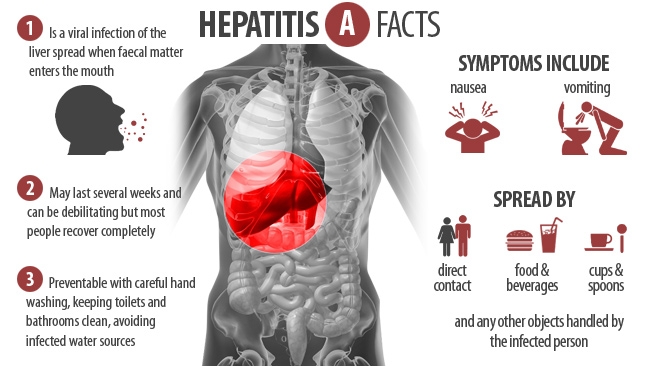
The Detroit Health Department is investigating two separate cases of Hepatitis A. The first case is in connection with a Detroit resident who works at Firewater Bar and Grill located at 107 E. Milwaukee. The second case involves another Detroit resident who works as a crew member at Little Caesars Pizza located at 12712 Fenkell.
The Detroit Health Department is conducting a thorough investigation of both establishments to ensure appropriate food handing and cleaning protocols are being followed. The Detroit Health Department has notified both establishments that infected employees are not to return to work until approved by their doctor. Both employees stopped working at the establishments once the diagnosis was confirmed. Both establishments have been cooperative with the investigation.
Generally, the risk of transmission of Hepatitis A from an infected food handler is low. Hepatitis A can potentially be prevented if you are given a vaccination after having come in contact with the virus. After exposure, vaccination is most effective within two weeks. Given the low, but potential risk, the Detroit Health Department is recommending vaccination for people who may have eaten at the two establishments.
Those who patronized Firewater Bar and Grill from October 15th through October 24th or consumed food from Little Caesars Pizza at 12712 Fenkell in Detroit from October 15th through October 26th should consult their primary care provider to receive the Hepatitis A vaccine as early as possible, and before November 7, 2017.
The Detroit Health Department will be offering free Hepatitis A vaccines at both of its Immunization Clinics Monday, Tuesday, Thursday and Friday, 8am to 5pm and Wednesday 9am to 6pm. The clinics are located at:
- The Samaritan Center (5555 Conner Street Detroit, MI 48213)
- The Family Place (8726 Woodward Avenue Detroit, MI 48202)
Southeast Michigan has seen an increase in Hepatitis A cases since 2016. High risk individuals identified in association with this outbreak include persons who: share injection and non-injection street drugs (including pain killers), have sexual activities with someone who has hepatitis A, have close contact, care for, or live with someone who has Hepatitis A, are homeless or have transient living situations, or are men who have sex with men.
“The Detroit Health Department has been working diligently to make sure we are identifying cases of Hepatitis A in the City, and working with the Michigan Department of Health and Human Services, hospitals, physicians, and community partners to increase awareness and encourage vaccination. “ said Dr. Joneigh S. Khaldun, Director and Health Officer of the Detroit Health Department.
Hepatitis A is a contagious liver disease that results from infection with the Hepatitis A virus. It can range in severity from a mild illness lasting a few weeks to a severe illness lasting several months. In over 99% of cases the body clears the disease is cleared without any long term consequences. Symptoms include fever, diarrhea, nausea, vomiting, abdominal, and sometimes yellow eyes and skin and dark urine. A person can get hepatitis A when they eat, drink, or touch their mouth with food, liquid or objects (including their hands) that have come into contact with stool from an infected person. Anyone experiencing these symptoms should seek medical attention immediately.
The best way to prevent Hepatitis A is through vaccination. The other way to prevent the spread of infection is to wash hands with soap and water: after using the bathroom, after diaper changes, and before handling food.
The Detroit Health Department can be contacted at 313-876-4000.